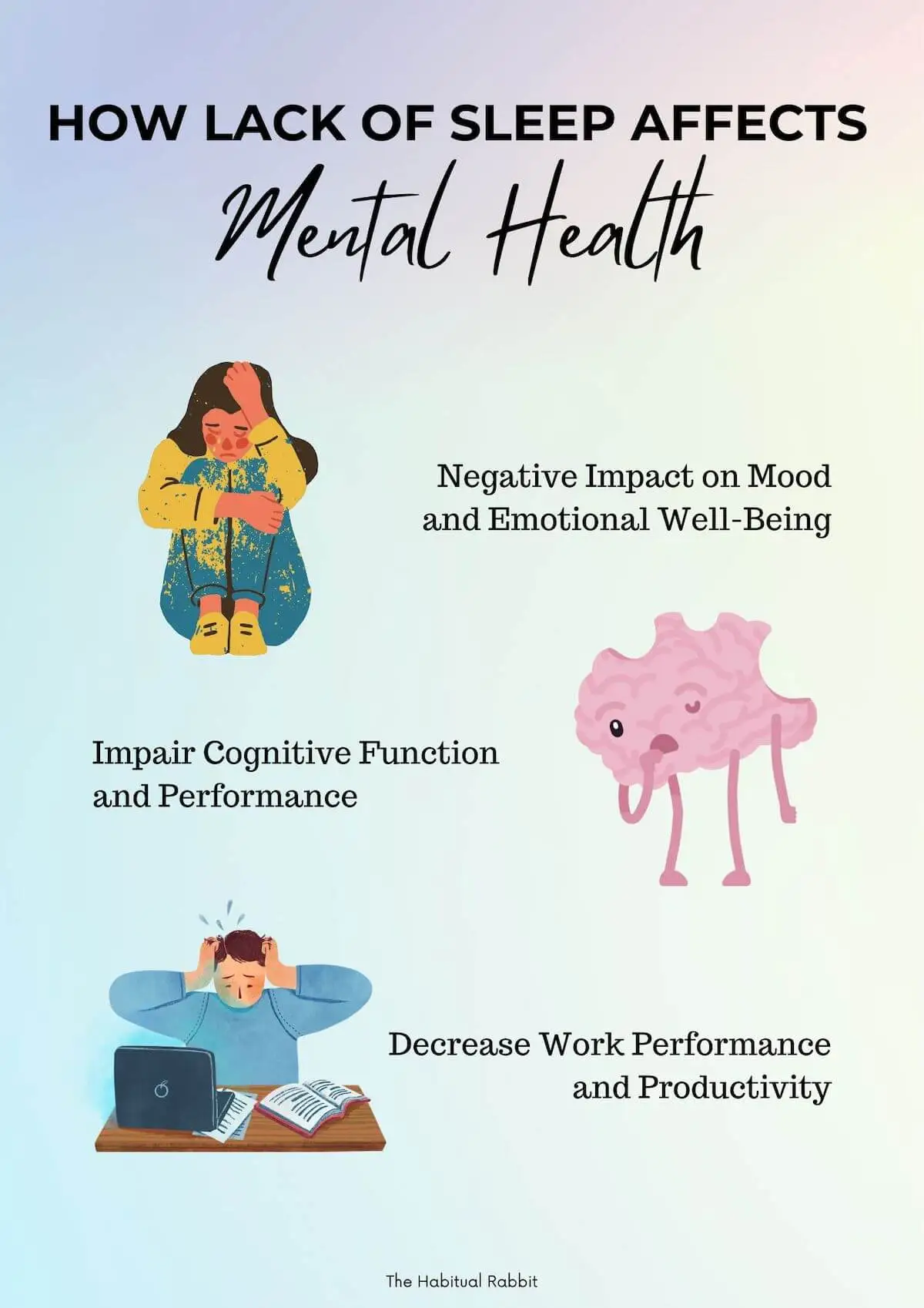
If you’re here, then you’ve probably experienced those restless nights when sleep seems to have eluded you. We’ve all been there; tossing and turning for hours in bed just to wake up and feel like you haven’t slept at all. Whether it’s due to stress, a busy schedule, or simply a case of insomnia, a lack of sleep can take a toll on our overall well-being.
Lack of sleep can have serious physical repercussions on your body and negatively impact your nervous system, immune system, and respiratory system leading to chronic illnesses like heart disease, high blood pressure, and obesity.
But did you know that lack of sleep can also affect your mental health?
Insufficient sleep can have a significant impact on our mood, cognitive function, and work performance. In this article, we’ll take a dive into the science behind how lack of sleep affects our mental health and explore the negative consequences it can have on various aspects of our lives.
Learn more on how to improve your mental health with proper sleep hygiene habits.
The Connection between Sleep and Mental Health
Sleep and mental health are intricately connected, forming a delicate symbiotic relationship. Adequate sleep is vital for maintaining good mental health, just as poor mental health can disrupt our sleep patterns. Scientific research has consistently shown a strong link between sleep deprivation and mental health issues such as anxiety, depression, and mood disorders.

Here’s the science behind it.
Sleep deprivation disrupts the delicate balance of neurotransmitters in our brains, such as serotonin, dopamine, and norepinephrine, which play crucial roles in regulating mood and emotions. Additionally, sleep loss leads to increased activity in the amygdala, the brain region responsible for processing emotions, while simultaneously reducing activity in the prefrontal cortex, which is involved in cognitive functions and emotional regulation.
Yes, this means that not only is your mood affected, but your productivity will also be negatively impacted, causing you to feel sluggish and behind on all your work!
Chronic sleep deprivation can trigger a vicious, never-ending cycle, as the negative impact on mental health may further exacerbate sleep problems. Conditions such as insomnia, sleep apnea, and restless leg syndrome can develop or worsen due to underlying mental health issues, creating a feedback loop that further disrupts sleep patterns.
Impact on Mood and Emotional Well-being

Have you ever noticed how you’re more likely to feel irritable, moody, or emotionally unstable after a sleepless night?
Lack of sleep can significantly impact our mood and emotional well-being. Sleep deprivation affects the brain’s ability to regulate emotions, leading to heightened emotional reactivity and an increased risk of experiencing negative emotions.
This may look like lashing out at something that you wouldn’t normally react so significantly to or a meltdown over a solvable issue.
Research has shown that sleep-deprived individuals are more likely to exhibit symptoms of depression and anxiety. In fact, a study published in the journal Sleep found that individuals with insomnia were 10 times more likely to develop depression and 17 times more likely to develop anxiety than those without sleep problems. These findings highlight the crucial role that sleep plays in maintaining a balanced emotional state.
Impair Cognitive Function and Performance
Have you ever struggled to focus or found it difficult to retain information after a sleepless night? That’s because sleep is critical in consolidating memories and facilitating learning processes. When we don’t get enough sleep, these processes are disrupted, leading to reduced and impaired communication between different parts of the brain.
Lack of sleep alters the balance of dopamine and serotonin, which are foundational neurotransmitters that regulate mood, attention, and cognitive processes. Disruption of these systems can result in decreased alertness, diminished motivation, and impaired cognitive performance.
Insufficient sleep also leads to increased levels of cortisol (stress hormones) in the brain. High levels of cortisol negatively affect the hippocampus, the brain region involved in memory formation and learning.
Do you ever wonder why you have a hard time remembering something you just learned? Or why you have to read a sentence multiple times while struggling to focus on the meaning?
That’s because high stress levels due to lack of sleep can impact our attention span, concentration, and memory, making it challenging to perform even simple tasks efficiently, like reading and comprehension.
Lack of sleep can also hinder our problem-solving skills, creativity, and decision-making abilities. According to the National Sleep Foundation, sleep deprivation can lead to impaired cognitive flexibility, making it harder for individuals to adapt to changing situations or think outside the box.
Decrease Work Performance and Productivity
The negative impact of sleep deprivation isn’t limited to our personal lives; it also spills over into our professional endeavors. Whether you’re a student burning the midnight oil or an office worker pulling an all-nighter to meet a deadline, lack of sleep can undermine your productivity and hinder your ability to perform at your best.
Studies have shown that sleep-deprived individuals are more prone to making errors, have slower reaction times, and experience a decline in overall productivity. In some professions, an impaired reaction may mean missing an important phone call, not responding quickly enough in a meeting or conversation, or daydreaming while at work. In other professions, like first responders or truck drivers, delayed reaction times can be a matter of life and death. National Highway Traffic Safety Administration reports that in 2017, an estimated 91,000 police-reported crashes involved sleepy drivers.
Key Takeaway
In a world that often values productivity over rest, it’s essential to recognize the profound impact that lack of sleep can have on our mental health. From affecting our mood and emotional well-being to impairing our cognitive function and work performance, sleep deprivation is a serious matter that warrants attention.
To safeguard our mental health, we must prioritize quality sleep as an integral part of our self-care routine. Establishing healthy sleep habits, such as maintaining a consistent sleep schedule, creating a conducive sleep environment, and practicing relaxation techniques before bed, can go a long way in ensuring we get the restorative sleep our minds and bodies need.
So the next time you find yourself tempted to sacrifice sleep for work or other activities, remember that a well-rested mind is a healthier mind. By giving ourselves the gift of sufficient sleep, we pave the way for improved mental well-being, enhanced cognitive function, and greater success in all aspects of our lives.
